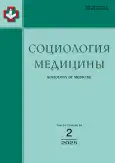Responses of pediatricians to questions on extremely low birth weight infants: a cross-sectional study
- Authors: Samsonova A.I.1, Krom I.L.1, Orlova M.M.2, Ertel L.A.3, Lipchanskaya T.P.1, Kovalenko E.V.1
-
Affiliations:
- Saratov State Medical University named after V. I. Razumovsky
- Saratov State University
- Kuban State University
- Issue: Vol 24, No 2 (2025)
- Pages: 115-122
- Section: SOCIOLOGY OF HEALTH AND DISEASE
- URL: https://journal-vniispk.ru/1728-2810/article/view/348612
- DOI: https://doi.org/10.17816/socm677726
- EDN: https://elibrary.ru/NVRKKQ
- ID: 348612
Cite item
Abstract
BACKGROUND: In 2011, new standards of medical birth criteria were adopted in Russia, corresponding to the World Health Organization recommendations of 1975. Newborns with extremely low birth weight are at high risk of developing disabling conditions and experiencing reduced overall quality of life.
AIM: The work aimed to analyze pediatricians’ opinions on issues related to the birth of extremely low birth weight infants.
METHODS: A cross-sectional survey was conducted in 2023–2024 in medical organizations of Saratov using an author-designed questionnaire. A total of 106 pediatricians with over 5 years of professional experience participated.
RESULTS: The study addressed decision-making regarding the need for resuscitation of extremely low birth weight infants and the permissibility of withdrawing life-support systems in cases of severe disabling conditions.
The majority of pediatricians (64.7%) disagreed with the current birth criteria. A total of 32.7% of respondents opposed resuscitative efforts for such newborns. Most participants (62.3%) reported never facing unfounded accusations of negligent homicide of newborns, which they attributed to the specifics of their work. Nearly half (46.7%) of respondents believed that the survival of extremely low birth weight infants results in a sharp deterioration of pediatric population health indicators.
CONCLUSION: Most pediatricians disagree with the current birth criteria. Their opinions are shaped by the uniquely high level of professional responsibility, the complexity of decision-making, unpredictable outcomes, and experiences of unjust accusations in the death of extremely low birth weight infants. The respondents emphasized the necessity for both parents to participate in decision-making regarding resuscitation, palliative care, and withdrawal of life-support systems in the event of disabling conditions in extremely low birth weight infants.
Full Text
##article.viewOnOriginalSite##About the authors
Anna I. Samsonova
Saratov State Medical University named after V. I. Razumovsky
Email: bespeshnui_angel@mail.ru
ORCID iD: 0000-0003-0326-1380
SPIN-code: 1042-1930
Russian Federation, Saratov
Irina L. Krom
Saratov State Medical University named after V. I. Razumovsky
Author for correspondence.
Email: irina.crom@yandex.ru
ORCID iD: 0000-0003-1355-5163
SPIN-code: 4854-1094
MD, Dr. Sci. (Medicine), Professor
Russian Federation, SaratovMaria M. Orlova
Saratov State University
Email: orlova-maria2010@mail.ru
ORCID iD: 0000-0003-2340-8343
SPIN-code: 1399-9666
Cand. Sci. (Psychology), Assistant Professor
Russian Federation, SaratovLudmila A. Ertel
Kuban State University
Email: ela1958@yandex.ru
ORCID iD: 0000-0002-9260-4914
SPIN-code: 4295-3168
MD, Dr. Sci. (Medicine), Professor
Russian Federation, KrasnodarTatyana P. Lipchanskaya
Saratov State Medical University named after V. I. Razumovsky
Email: tatyanalp@yandex.ru
ORCID iD: 0000-0002-7755-1834
SPIN-code: 5698-6429
MD, Cand. Sci. (Medicine), Assistant Professor
Russian Federation, SaratovElena V. Kovalenko
Saratov State Medical University named after V. I. Razumovsky
Email: kovlena@mail.ru
ORCID iD: 0000-0003-3426-1236
SPIN-code: 9277-1454
Russian Federation, Saratov
References
- Popov VL, Sokolova OV. About the interpretation of the cause of death of a newborn in unusual conditions. Forensic medical expertise. 2022;65(2):46–50. doi: 10.17116/sudmed20226503146 EDN: AGUCBQ
- Efimov DK, Ryazankina KB. The effectiveness of using modern principles of medical support for children born with extremely low body weight (ELBW) (case report of a child e., born with a body weight of 485 grams). Russian pediatric journal. 2024;5(1):15. EDN: DIAQIN
- Bolbocean C, van der Pal S, van Buuren S, et al. Health-related quality-of-life outcomes of very preterm or very low birth weight adults: evidence from an individual participant data meta-analysis. Pharmacoeconomics. 2023;41(1):93–105. doi: 10.1007/s40273-022-01201-2 EDN: DFHPHC
- Prisyazhnaya NV. Sociology of social orphanhood: modern discourses of studying the problem. In: Society and Health: Current State and Trends of Development. Moscow: FGAOU VO Pervyi MGMU im. I.M. Sechenova Minzdrava Rossii; 2013. P. 185–194. (In Russ.) EDN: RNPFTP
- Prisyazhnaya NV. Social anamnesis and the place of health in the system of life values of pupils of orphanages. In: Sociology of medicine: science and practice: collection of articles. Reshetnikova AV, editor. Moscow: Izdatel'stvo Pervogo MGMU im. I.M. Sechenova; 2012. P. 303–308. (In Russ.) Available from: https://rusneb.ru/catalog/001980_000024_DVGPB%7C%7C%7CBIBL%7C%7C%7C0000015496/
- Reshetnikov AV, Prisyazhnaya NV. Studying the nature of social orphanhood in correlation with status characteristics and personal health. Sociology of medicine. 2020;19(1):25–31. doi: 10.17816/1728-2810-2020-19-1-25-31 EDN: NMGYTW
- Kaempf JW, Moore GP. Extremely premature birth bioethical decision-making supported by dialogics and pragmatism. BMC Med Ethics. 2023;24(1):9. doi: 10.1186/s12910-023-00887-z EDN: AMLRZC
- Arzuaga BH, Cummings CL. Deliveries at extreme prematurity: outcomes, approaches, institutional variation, and uncertainty. Curr Opin Pediatr. 2019;31(2):182–187. doi: 10.1097/MOP.0000000000000731
- Lantos JD. Ethics of care for the micropreemies. Just because we can, should we? Semin Fetal Neonatal Med. 2022;27(2):101343. doi: 10.1016/j.siny.2022.101343 EDN: QPVCQF
- Lee CD, Nelin L, Foglia EE. Neonatal resuscitation in 22-week pregnancies. N Engl J Med. 2022;386(4):391–393. doi: 10.1056/NEJMclde2114954 EDN: IUMCMH
- Backes CH, Rivera BK, Pavlek L, et al. Proactive neonatal treatment at 22 weeks of gestation: a systematic review and meta-analysis. Am J Obstet Gynecol. 2021;224(2):158–174. doi: 10.1016/j.ajog.2020.07.051 EDN: JDVLZG
- Lantos JD. Ethical implications of the shifting borderline of viability. Semin Perinatol. 2022;46(2):151531. doi: 10.1016/j.semperi.2021.151531 EDN: ICEBMC
- Marmion PJ. Refusing to examine extremely premature newborns. Linacre Q. 2018;85(1):9–10. doi: 10.1177/0024363918756390
- Lavin JP Jr, Kantak A, Ohlinger J, et al. Attitudes of obstetric and pediatric health care providers toward resuscitation of infants who are born at the margins of viability. Pediatrics. 2006;118 Suppl 2:S169–176. doi: 10.1542/peds.2006-0913O
- Baranov AA, Albitsky VYu, Volgina SYa. Deep premature babies as a bioethical problem. Russian Paediatric Journal. 1999;(1):29–32. (In Russ.) EDN: YLDFRZ
- Delaru NV. Neonatologists attitude to management of newborns with extremely low body weight: negative attitude prevails. Journal of Volgograd State Medical University. 2008;(2(26)):22–23. EDN: KVGXAT
- Delaru NV. Respiration of extremely low birth weight preterm infants: neonatologists' attitudes are becoming more positive. Russian bulletin of perinatology and pediatrics. 2018;63(4):143. (In Russ.) EDN: XXRBGX
Supplementary files






